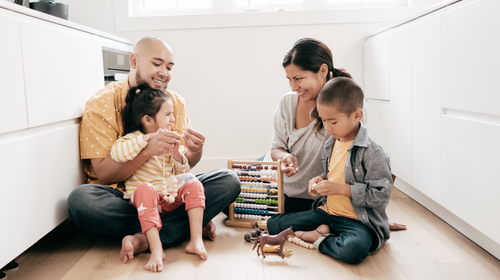Teach kids about dollars and sense!
Do you want the children in your whānau to be financially savvy? Give them a head start and teach them about how money works while they’re young.
Research shows that children who learn about financial concepts at an early age tend to do better with money when they grow up. Let’s dive into three ways to teach tamariki about money:
Tip One: Use real-life scenarios
Help kids understand the value of money by letting them make spending decisions in real-life situations.
You could give them a budget for a gift for a friend or challenge them to plan a fun whānau outing that cannot go over a set amount of money. Another easy way is to include them in grocery shopping by helping them compare the cost of their favourite food across brands and chat about why they cost different amounts, and decide on which one meets the budget.
By allowing kids to make spending decisions in real-life situations, you can help them understand the value of money and the importance of budgeting, decision-making and smart shopping habits.

Tip Two: Encourage regular saving
Support tamariki in developing a habit of saving money by opening a savings account for them and letting them see the balance as it grows. You could contribute to the account through pocket money or an allowance, depending on their age and your own preferences. Don’t worry how much they get – small but consistent amounts going into their account will highlight the benefits of savings as they see their money increase.
If they’re obsessed with buying the latest “it” toy, encourage them to set a savings goal and track their progress as they save up for it. This helps them understand the trade-offs involved in spending.
Tip Three: Teach them about wants and needs
Children can see everything they want as a need. Teach them the difference by talking to them about “needs” as something essential to survive and live a healthy life, such as food, water, shelter, and clothing. On the flip side, a “want” is something we desire, but it is just a nice to have, such as a cool new toy, expensive clothing, or a pricey gadget.
Explain the difference between both, challenge them to name things from both categories and ask them whether they think it’s a want or a need. Chat with them about their answers and explore the thinking behind them.
We're here to support and set your tamariki or mokopuna up for their best financial future with:

Birth Benefits
Open an Achiever Saver or Bonus Saver for your child or grandchild before their first birthday, and we’ll make a one-off payment of $100 into their account.
Check out our accounts
Kids Accounts
You can open an account or a term deposit in your child or grandchild’s name and manage it for them – making a start on saving for their future.
Apply to open a Kids Account
First Account
Once your child turns 13, they can have their own Police Credit Union account with internet and mobile banking as well as a Debit Mastercard.
Apply to open


